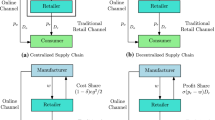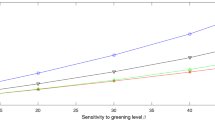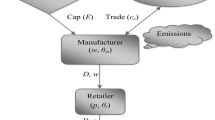Abstract
The current study brings to light the environmentally sustainable and efficient customer-centric economic strategies of a three-stage dual-channel green supply chain (TS-DCGSC) with a single supplier, manufacturer, and retailer. This investigation explores an amalgamation of product flow between traditional retail and online channels. In addition to the pricing strategy, the proposed model implements the greenness of products as a significant decision. This study maximizes the net profit of the entire supply chain in a centralized decision-making process and the net profit of each stakeholder in a decentralized decision-making process. One case study numerically confirms that the TS-DCGSC model aligns with its intended environmentally conscious and customer-centric approach in the centralized decision-making process. A two-part tariff (TPT) contract has been developed to ensure that each stakeholder can make rational decisions aligning with the centralized strategy. This study designed a mathematical framework for measuring contract fairness, Pareto improvement, and coordinating efficiency. The results confirm that the TPT contract is fair, promotes Pareto improvement, and successfully coordinates the TS-DCGSC.



Similar content being viewed by others
Data availability
The manuscript contains all the necessary data.
References
Ansari, Z. N., & Kant, R. (2017). A state-of-art literature review reflecting 15 years of focus on sustainable supply chain management. Journal of cleaner production, 142, 2524–2543.
Bai, Q., Chen, M., & Xu, L. (2017). Revenue and promotional cost-sharing contract versus two-part tariff contract in coordinating sustainable supply chain systems with deteriorating items. International Journal of Production Economics, 187, 85–101.
Bechtsis, D., Tsolakis, N., Vlachos, D., & Iakovou, E. (2017). Sustainable supply chain management in the digitalisation era: The impact of automated guided vehicles. Journal of Cleaner Production, 142, 3970–3984.
Bhattacharya, A., Dey, P. K., and Ho, W. (2015). Green manufacturing supply chain design and operations decision support.
Canbulut, G., Köse, E., & Arik, O. A. (2021). Handling of revenue sharing contracts within the scope of game theory. Soft Computing, 25(1), 321–329.
Chakraborty, T., Chauhan, S. S., & Vidyarthi, N. (2015). Coordination and competition in a common retailer channel: Wholesale price versus revenue-sharing mechanisms. International Journal of Production Economics, 166, 103–118.
Chen, J., Zhang, H., & Sun, Y. (2012). Implementing coordination contracts in a manufacturer stackelberg dual-channel supply chain. Omega, 40(5), 571–583.
Cui, L., Guo, S., & Zhang, H. (2020). Coordinating a green agri-food supply chain with revenue-sharing contracts considering retailers’ green marketing efforts. Sustainability, 12(4), 1289.
Das, R., Barman, A., Roy, B., & De, P. K. (2022). Pricing and greening strategies in a dual-channel supply chain with cost and profit sharing contracts (pp. 1–34). Development and Sustainability: Environment.
Diabat, A., Kannan, D., & Mathiyazhagan, K. (2014). Analysis of enablers for implementation of sustainable supply chain management-a textile case. Journal of cleaner production, 83, 391–403.
Gao, J., Xiao, Z., & Wei, H. (2021). Competition and coordination in a dual-channel green supply chain with an eco-label policy. Computers & Industrial Engineering, 153, 107057.
Ghosh, D., & Shah, J. (2015). Supply chain analysis under green sensitive consumer demand and cost sharing contract. International Journal of Production Economics, 164, 319–329.
He, P., He, Y., & Xu, H. (2020). Buy-online-and-deliver-from-store strategy for a dual-channel supply chain considering retailer’s location advantage. Transportation Research Part E: Logistics and Transportation Review, 144, 102127.
Heydari, J., Kermani, E. Z., Tat, R., & Heydari, E. (2020). Channel coordination in a two-echelon supply chain with lead time reduction using a wholesale price scheme. International Journal of Procurement Management, 13(6), 756–774.
Hong, Z., & Guo, X. (2019). Green product supply chain contracts considering environmental responsibilities. Omega, 83, 155–166.
Kao, K. C., Hill, S. R., & Troshani, I. (2021). A cross-country comparison of online deal popularity effect. Journal of Retailing and Consumer Services, 60, 102402.
Laari, S., Töyli, J., & Ojala, L. (2017). Supply chain perspective on competitive strategies and green supply chain management strategies. Journal of cleaner production, 141, 1303–1315.
Liu, H., Long, H., & Li, X. (2020). Identification of critical factors in construction and demolition waste recycling by the grey-dematel approach: A chinese perspective. Environmental Science and Pollution Research, 27(8), 8507–8525.
Liu, X., Du, W., and Sun, Y. (2020b). Green supply chain decisions under different power structures: Wholesale price vs. revenue sharing contract. International Journal of Environmental Research and Public Health, 17(21):7737.
Panja, S., & Mondal, S. K. (2020). Exploring a two-layer green supply chain game theoretic model with credit linked demand and mark-up under revenue sharing contract. Journal of Cleaner Production, 250, 119491.
Rahmani, K., & Yavari, M. (2019). Pricing policies for a dual-channel green supply chain under demand disruptions. Computers & Industrial Engineering, 127, 493–510.
Samanta, B., & Giri, B. C. (2021). A two-echelon supply chain model with price and warranty dependent demand and pro-rata warranty policy under cost sharing contract. Decision Making: Applications in Management and Engineering, 4(2), 47–75.
Shahryari Nia, A., Olfat, L., Esmaeili, A., Rostamzadeh, R., & Antuchevičienė, J. (2016). Using fuzzy choquet integral operator for supplier selection with environmental considerations. Journal of Business Economics and Management, 17(4), 503–526.
Sheu, J.-B. (2016). Buyer behavior in quality-dominated multi-sourcing recyclable-material procurement of green supply chains. Production and Operations Management, 25(3), 477–497.
Sulistio, J., & Rini, T. A. (2015). A structural literature review on models and methods analysis of green supply chain management. Procedia Manufacturing, 4, 291–299.
Swami, S., & Shah, J. (2013). Channel coordination in green supply chain management. Journal of the operational research society, 64(3), 336–351.
Taleizadeh, A. A., Alizadeh-Basban, N., & Sarker, B. R. (2018). Coordinated contracts in a two-echelon green supply chain considering pricing strategy. Computers & Industrial Engineering, 124, 249–275.
Ülkü, M. A., & Hsuan, J. (2017). Towards sustainable consumption and production: Competitive pricing of modular products for green consumers. Journal of cleaner Production, 142, 4230–4242.
Xiao, T., & Shi, J. J. (2016). Pricing and supply priority in a dual-channel supply chain. European Journal of Operational Research, 254(3), 813–823.
Xu, J., Qi, Q., & Bai, Q. (2018). Coordinating a dual-channel supply chain with price discount contracts under carbon emission capacity regulation. Applied Mathematical Modelling, 56, 449–468.
Xu, L., Wang, C., & Zhao, J. (2018). Decision and coordination in the dual-channel supply chain considering cap-and-trade regulation. Journal of Cleaner Production, 197, 551–561.
Xu, Z., Liu, X., Bai, C., and Hu, L. (2015). Green marketing: a grey-based rough set theory analysis of activities. International Journal of Innovation Science.
Yang, M., & Gong, X.-M. (2021). Optimal decisions and pareto improvement for green supply chain considering reciprocity and cost-sharing contract. Environmental Science and Pollution Research, 28(23), 29859–29874.
Zhang, C., Liu, Y., & Han, G. (2021). Two-stage pricing strategies of a dual-channel supply chain considering public green preference. Computers & Industrial Engineering, 151, 106988.
Zhou, Y.-W., Guo, J., & Zhou, W. (2018). Pricing/service strategies for a dual-channel supply chain with free riding and service-cost sharing. International Journal of Production Economics, 196, 198–210.
Zhu, W., & He, Y. (2017). Green product design in supply chains under competition. European Journal of Operational Research, 258(1), 165–180.
Funding
The authors declared that no financial support connected with the study described in this article.
Author information
Authors and Affiliations
Corresponding author
Ethics declarations
Conflict of interest
The authors have no conflicts of interest to declare.
Ethical approval and consent to participate
The authors adhered to ethical standards during the research and provided informed consent to participate.
Consent for publication
The authors have given their consent for the publication.
Additional information
Publisher's Note
Springer Nature remains neutral with regard to jurisdictional claims in published maps and institutional affiliations.
Rights and permissions
Springer Nature or its licensor (e.g. a society or other partner) holds exclusive rights to this article under a publishing agreement with the author(s) or other rightsholder(s); author self-archiving of the accepted manuscript version of this article is solely governed by the terms of such publishing agreement and applicable law.
About this article
Cite this article
Das, M., Rahaman, M., Alam, S. et al. Developing sustainable and efficient customer-centric strategies for a three-stage dual-channel green supply chain: a game-theoretic approach with two-part tariff contract. Environ Dev Sustain (2024). https://doi.org/10.1007/s10668-024-04883-0
Received:
Accepted:
Published:
DOI: https://doi.org/10.1007/s10668-024-04883-0




